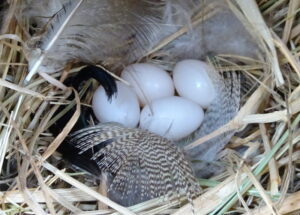 Every morning, I walk with my dogs before breakfast. Since one of my bird nesting boxes is near the trail head, I often checked in to see how the resident Tree Swallow family was doing. At last count, there were four eggs in a nest decorated with all sorts of feathers she’d collected. Each new egg was accompanied by new feathers.
Every morning, I walk with my dogs before breakfast. Since one of my bird nesting boxes is near the trail head, I often checked in to see how the resident Tree Swallow family was doing. At last count, there were four eggs in a nest decorated with all sorts of feathers she’d collected. Each new egg was accompanied by new feathers.
That morning, I opened the side door and witnessed a catastrophe. No eggs. No feathers. Only the scrambled remnants of the nest. All four eggs were gone along with every beautiful feather.
The culprit was probably a raccoon doing what raccoons do to feed their family. Bird eggs? Delicious and perfect for the raccoon kids, but I loved each tiny oval promise. I loved the Tree Swallow Mama who added feathers she found—white, black, stripped, tan—with each new egg.
It hurt to see the destruction—and it hurt more knowing I could have prevented it. Why didn’t I put the predator guard on the front of the box as soon as there was one egg? Why? I inspected the box again and wept at the loss of life and promise. Then I cursed myself. “You’re an idiot, Elaine. This murder is your fault.”
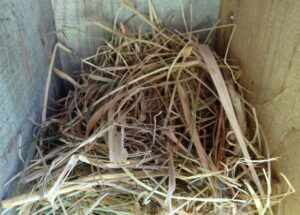 I’d removed the new predator guards from two nesting boxes close to my house earlier in the spring when the birds seemed wary of them. The Noel Predator Guards (wire tunnel entrances) were an experiment after many nests were raided last year. I’d read birds can be scared by the tunnel and it can be put on after an egg is laid because a bird won’t willingly abandon her eggs.
I’d removed the new predator guards from two nesting boxes close to my house earlier in the spring when the birds seemed wary of them. The Noel Predator Guards (wire tunnel entrances) were an experiment after many nests were raided last year. I’d read birds can be scared by the tunnel and it can be put on after an egg is laid because a bird won’t willingly abandon her eggs.
When the Bluebird female deposited two eggs in her nest down the fence, I screwed the predator guard in place. I watched through a telescope as the Papa Bluebird went through the tunnel first and his mate followed him. A few days later, I checked and there were four healthy Bluebird eggs.
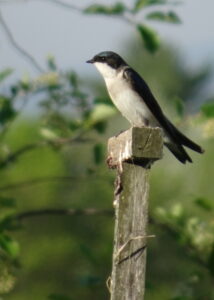 The Tree Swallow started her nest later. Why didn’t I put the guard on as soon as there was an egg? I can’t tell you. I can’t explain it to myself. Yes, they were close to the house, but hungry critters prowl around at night and last year many nestlings were killed. I’d already seen the guards work, but I got distracted and didn’t finish the job. The Chickadees, Wrens, and another box of Bluebirds in the field figured it out when the guards were left on. They didn’t need my interference.
The Tree Swallow started her nest later. Why didn’t I put the guard on as soon as there was an egg? I can’t tell you. I can’t explain it to myself. Yes, they were close to the house, but hungry critters prowl around at night and last year many nestlings were killed. I’d already seen the guards work, but I got distracted and didn’t finish the job. The Chickadees, Wrens, and another box of Bluebirds in the field figured it out when the guards were left on. They didn’t need my interference.
The Swallow male sat on his perch for a few more days. The female stood on top of the predator guard I’d carefully screwed in place after the eggs had disappeared. Did she look bewildered or was I projecting? Was she grieving? I didn’t know, but I was. Soon they disappeared. Maybe they found a place to start a new family.
I cleaned out the battered nest hoping the Bluebirds would use the box for a second brood, but a few days later, I looked out through my telescope and the Tree Swallows were back. She went in and out of the house (through the predator guard) building a new nest. Her mate sat on the perch guarding while she swooped inside carrying nesting materials.
I learned a lesson about attachment, mindfulness, and the value of predator guards, but I hated learning at the cost of precious lives. I’m sorry I didn’t protect your family, Mama Swallow, and I’m grateful for your persistence. I’m so glad you’re back.
***
The female Swallow carried grasses into the box all morning, occasionally pausing inside the box. I didn’t disturb her, but couldn’t stop watching through my binoculars and rejoicing. I’m waiting for Swallow eggs, but all four Bluebirds hatched. Are there other maniacs out there watching birds build nests or Monarch caterpillars chew milkweed leaves instead of writing or sorting through piles? Or is this watching exactly what I “ought” to do? It’s clear what my priorities are as I scan the gardens and fields for butterflies and birds.
For a post about bluebirds, see When the Bluebirds Fledged. For another post about providing housing for birds, see The Problem with Preferences.
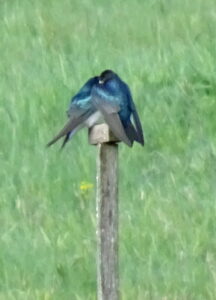
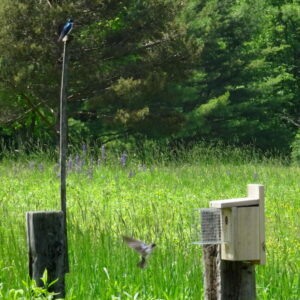
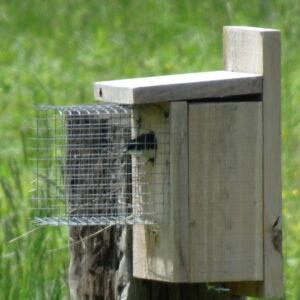
Oh, how I whooped with joy by the time I reached the end of your post Elaine! So much so that Lin ran up the stairs wondering what on earth was going on! Hmm, I haven’t heard of those predator guards before but will definitely look into getting one for the nest box we have in the garden which the wrens seem to really appreciate. What a wonderful story you’ve shared in today’s post which makes me think of “Bone” by Marion Woodman (which I’ve just finished reading) and the way in which she explored her own “Dying into Life”.
I was greatly reminded, much like Mama and Papa Swallow no doubt, that I won’t be free of the recent grief inside of me until I let this sadness to pass through me. So sitting on the perch (or in a deckchair in the garden in my case) for a few days was the swallow’s way of dealing with their grief. Back to Marion and I see that I’ve noted in my book, “Transition begins in forgiveness. To forgive (protect & try again!) is to transform what we would otherwise reject.” Whether we like it or not, we must allow grief to pass. Love and light, Deborah.
Deborah, I hadn’t heard of predator guards until last year when there were so many eggs and nestlings stolen from the boxes. I did some google research and found out about them that way. The guards are working and no babies or eggs have disappeared this year. (Attachment means I had to figure out how to save them so I could remain attached!!) Wrens have their own box here near a willow tree and rarely bother the other nesting birds–quite the opposite of chickadees who seem to like nesting close to each other. I have 3 chickadee nests which means about 20 babies in all. As you know, I’m also re-reading ‘Bone’ and I’m about half way through. It means so much more to me now that I’m facing my own health problems–although Meniere’s Disease isn’t as threatening as cancer except when I lose all balance. With grief, it’s a meditation to sit on our perch or garden chair or meditation cushion and let the fact of mortality in. I never tried to push sorrow away and I couldn’t anyway. It’s amazing that Marion lived through that illness and went on to teach again.
I was crushed and transformed by Vic’s death, but there was nothing to forgive other than the fact of mortality itself. He tried hard to live and love until his last week. Love and healing to you, dear Debbie.
Oh, I look forward to hearing and seeing on FB and perhaps your wonderful blog how this year’s chicks fare this season. Are the beautiful Monarchs with you yet?
Re-reading Bone has been such a joy as I dig deep, down to the bone. Yes, what a healing meditation is, to sit and grieve, face one’s reality and not run away.
Your own incredible book, “Leaning Into Love” will be my next reread! I can’t wait.
I’ve only seen one adult Monarch butterfly but someone deposited a few eggs under milkweed leaves when I wasn’t looking, so I have 8 Monarch caterpillars in the back porch nursery. I end every walk, morning and evening, with a search for Monarch eggs in a new area. The dogs like our extended time in the fields. I’m working on writing something longer (a book or pamphlet?) now, but nothing has the passion of that time during Vic’s illness and after his death. I admire the indigenous cultures that remember the ancestors and loved how the Tibetans made altars with whatever the dead person loved. Sometimes there were cigarettes, sweets, or little bottles of whisky on the altar. What did your mother love?
She loved nature, walking, poetry and books. All books. She was a voracious reader! Hmm, so it’s true, an apple doesn’t fall far from the tree. Oh, and she loved to laugh, alot!
Wow, possibly a new book or pamphlet?! I’m beyond excitement! Following my mother’s death I realise that I need to sit with my Animus Diet book a while longer.
Truly, I don’t know what I’m doing next–and it may be nothing–but there’s an idea playing in my head and I have to give it a try. I’ll see if Nature cooperates and if Archetypal meaning appears. It’s just a nugget of an idea now, but I’m writing. These things take as long as they take or another option is I don’t have the enthusiasm to do it. We’ll see…
Elaine,
I love your keen observations of natural events! Please don’t stop. The cycles of nature are perhaps more real than what we experience in our heated brains and houses. The grounding that nature provides is a nourishing basis for our lives, even when things go wrong and we grieve.
Who knew about the feather decorations that the swallows provide? But, how would racoons get into that tiny hole for the birds? I can imagine only a snake or chipmunk wiggling their way in. Perhaps a motion-triggered night camera can reveal the marauders and other critters, but your solution is better!
Hugs, Myra
Thank you, Myra. The cycles of nature nourish me always, but especially when things go wrong and I’m grieving. I walked at least 3 times a day the summer after Vic’s death, looking for every drop of beauty and every sign of the new, maturing, and dying. Now with Meniere’s, I keep walking (cell phone with me) although I sometimes stagger like a drunk because the inner ear problems make my balance poor.)
Swallows sometimes do a lot of decorating. There are two eggs in the box now with no feathers–so far. Raccoons have small agile hands, so they reach right in entry hole and take eggs or babies. Snakes also love eggs, but they’re kept out by the guards and by wrapping the poles with mesh and chipmunks don’t seem interested. House sparrows will destroy another birds nest, but they make a bigger mess. I guess raccoon because of past experience with them and their agile hands and clever minds (we put spring loaded hooks on the box doors because they figure out how to open a regular hook), but whoever the culprit is, the predator guard seems to work. I’m relieved!! We all need predator guards. Sending you a circle of healing.
After realizing the number of natural predators, over the last few years I’ve taken it upon myself to take the larvae inside-equipped with mountains of milkweed. 34 made it this year. It makes me happy.
As far as your experience, Elaine, I have had the same types of thing happen to me. Having lost much of our connection to the natural world, I see us humans pretty much as bumbling-though some of us well-meaning-giants. The birds returning to the nest is a sure sign of the mothers forgiveness and patience with us.
Also important to recognize how many beautiful birds have flown free due to your loving care…
I have a Monarch nursery on my back porch, Pamela, and keep a good supply of milkweed on hand. Last year, I released ~150 Monarchs during the summer and many were large migrators. Milkweed grows all over in the fields here. When I find an egg, I bring it in and keep it in a safe place (large covered glass pan lined with damp bamboo towels) until it hatches. Then I move it to a 1/2 cup jar with a fresh leaf and when it’s about 3rd or 4th instar, I move it to a mesh butterfly crate with similarly sized caterpillars and many milkweed cuttings to feed them until they climb to the top of the crate and make a chrysalis. I have only 8 caterpillars so far and have only seen one adult Monarch. Eight is a more than usual for June 9, so as always, we’ll see what happens next. I’m glad to know you’re also caring for the little ones. The Monarchs need our help.
I have been forgiven. There are two new swallow eggs this morning and all the babies from chickadees to bluebirds to wrens are doing well in the other nesting boxes. I’m a fan of predator guards! Thanks for your supportive comment.
I’m so glad the swallows came back, Elaine! I really love how she offers a feather for each egg, and how you recorded that, and I felt a real shock of loss to hear of the attack.
I saw both parents (first thing I look for out the window when I wake up.) When I took the dogs out, I opened the nesting box and found two perfect eggs and no feathers. They don’t follow my rules, but I expect feathers could show up anytime–whenever she finds one that strikes her fancy. It could also be a different Tree Swallow female in the box. I have no way of knowing, but I’m glad she’s there and her mate is attentive. It’s a dangerous world.
Knowing the season, I have imagined you immersed in nature these days, and so you are.
I’m sure you know that it is natural for animal predators to prey, and it is human to become distracted and forget. Like you, I got a woebegone story out of my lack of mindfulness recently, featured in my blog post this week. The trick is to forgive ourselves. We are human; we are prone to forget important things. Your story reminds me that forgetfulness is a universal experience.
I’m glad your story had a happy ending. Nature does prevail!
Yes, I’m immersed in planting and birding and searching for monarch eggs. I have 8 caterpillars so far. The raccoon (or other predator) was only doing what comes naturally, but I get so much pleasure from watching the birds through binoculars and telescope and camera. (This is what people who don’t have a television and can’t hear music do.) I look forward to reading your story. We’re only human! In this case, there are 2 eggs so far and I saw some sweet swallow love-making on the perch. More eggs to come–and I hope more feathers. Sending love and faith in happy endings.
After I pressed SEND here I thought of another recent example, this from a dear friend.
About two weeks go, my friends of 50+ years found a beloved family pet in the trunk of her car. Apparently, she had left the trunk of the car open as she was toting groceries into the house. In the meantime, the beloved family cat hopped in and snuggled among blankets in the back of the trunk. Of course she plunked the trunk down, not knowing kitty, now trapped, had made a “nest” way in the back. She and her family searched and searched for the dear pet, and found him dead.
She is having a hard time forgiving herself, but I told her an even worse story (which I won’t recite here) which let her know this truth: Accidents happen because we are human. At first, she was inconsolable, but now she has had a chance to process it somewhat. Like Deborah above suggests, we have to allow the grief and regret to pass through us, processing the experience as best we can before we can move on. Hugs!
Ouch, oh, ouch. That’s a hard one, Marian, and it happens. I could counter with an awful experience my son had with a pet, but I’ll spare you the details. He called sobbing, but there was nothing to be done beyond forgiving himself. I could only cry with him. Yes, I agree we must let ourselves grieve whether we feel guilty about the loss or not. We always imagine we know the Higher Plan, but our human perspective is so small.
Indeed
Oh, my dear! It never can be your fault. It is nature, and it is brutal somehow. But it keeps its harmony for sure. At least, there was a happy end. As I’d once mentioned, we have a lot of birds in our garden this year, and as I already was there, I observed a Titmouse, which lays eggs every Spring in a little house that we have hung on the wall, have new babies. And she flew to and forth to nourish and nurture her children. It was fascinating. Good luck to the newcomers.
Ah, only my fault because I didn’t complete the essential step. We humans are slow learners, but I won’t forget again. The guard is working because I put it on and the new eggs are protected. Because I’m a curious sort and because males help feed the young in most species, I looked up Titmouse and learned this: “Both parents feed the young, and, quite interestingly, young from the first brood will often help raise the second brood of the season by assisting in the feeding of their brothers and sisters.” You didn’t just see the Mama nurturing the kids, but the Papa and maybe the whole family if it was a second brood. Nature is a great archetypal teacher.
Absolutely agree with you, my friend. And we must still learn a lot, and not be so lazy and slowly!♥️
The Tree Swallow returned and she has four little hatchlings now. I haven’t looked at them for a few days since I thought she deserved peace.
I can imagine your dismay Elaine in the destruction of the eggs especially after seeing how carefully and delightfully the preparations for nesting were made. Glad that they’re back though. Hope the tunnel continues to work. What a clever adaptation by you – and them
Susan, I found directions for the “Noel guard” or tunnel online and the man who helps me with the land made them. The birds don’t seem to mind them, so it was my “over-mothering” that made me remove them in early spring. The guards will stay in place now and I’m glad they’re working in all the nesting boxes. I love having the birds around so I can watch and learn. My land is a little nature sanctuary next to the national forest and I’m so glad I can protect a few creatures. Life is fragile and dangerous for birds and most humans. I know you know that first hand.
You are so loving and caring Elaine of nature, your birds, and animals in general. What a heartbreak to find the eggs gone. I’ve never heard of predator guards and would never have known to use one. You are such a blessing to our world, be well my friend, Cheryl
Thank you, Cheryl. Maybe this is what happens when a woman doesn’t have grandkids? Last year, my nesting boxes were raided over and over again–sometimes the eggs and sometimes the baby birds. It hadn’t happened before and it broke my heart. I could keep snakes out by using old wire mesh to wrap the poles, but a raccoon’s arm could get through the round hole in the box and treat the contents like a grocery store. Other than the tree swallow nest which was my screw-up, all the eggs and baby birds survived this year. And the tree swallows returned, laid four more eggs, and those are now hatched with babies nestled in the feathers. Nature is forgiving sometimes.
Dear Elaine,
I can’t say it any better than another of your readers (Myra) did:
“I love your keen observations of natural events! Please don’t stop. The cycles of nature are perhaps more real than what we experience in our heated brains and houses. The grounding that nature provides is a nourishing basis for our lives, even when things go wrong and we grieve.”
If you consider yourself a maniac for “watching birds build nests or Monarch caterpillars chew milkweed leaves instead of writing or sorting through piles,” I pray that the world may be full of maniacs. This is my first week of retirement, and I now have a clear goal for myself: to become more of a maniac!
It was also lovely to read that you’ve a nugget of an idea about which you’re writing, regardless of what shape it takes or how long. I have been having many retirement dreams; I had one last week in which an older man was expressing despair about his life, and then, when a wise woman told a story about the essential good and simplicity evident in the way a mentally disabled relative of mine is living, he said he had real hope for the first time. The woman then stuffed his hands full of money and told him he must write about it. So I imagine I will be writing as well, and have begun journaling again in the mornings.
I re-read “Bone” shortly after I was diagnosed with a chronic illness, but I realize it will be even more meaningful to me now, since I have been living for almost four years with it—and it has progressed over time. With our new puppy, I am walking for the first time without my walking sticks, and I think of you when “I sometimes stagger like a drunk” because of my poor balance. You are an inspiration to me, and I am practicing focusing on gratitude for what I am still able to do and the joy of having a puppy in my life.
Love and healing to you, anne
Dear Anne, listen to that wise woman. I look forward to reading any of your writing you decide to share. My summer writing project is based on Monarchs and here I am kneeling in front of a Monarch mesh crate filled with milkweed shoots watching (a little like a maniac?) them. There are 6 chrysalises, 2 large caterpillars hanging in J hooks (pre-chrysalis position) and two caterpillars munching the newest milkweed shoot, including the one I found this morning. There aren’t many Monarchs out there this year but if just a few of these are females along with at least one horny male and I release them in my better and bigger than ever milkweed patches, there will hundreds of eggs. Part of my sense of mania is my fussing and not trusting all will turn out OK. Then this morning just walking along the trail to cut a milkweed shoot to feed the brood, I found a caterpillar, too. Part of the process is having faith in Nature as She struggles.
I’m reading ‘Bone’ again in small bites because it helps me see how a wise woman like Marion Woodman handles her catastrophe–and how human she is and how she isn’t afraid to show her vulnerability and fear. Marion loved her little dog and her therapist called him Marion’s “soul animal. This poor balance problem will be a constant for me according to the doctor who did the cochlear implant surgery because there is so much inner ear damage. He also encouraged me to keep trying, so I made an appointment with an excellent physical therapist. I’ve had have to wait a while, but will see her July 1. Meanwhile, I’m returning to old balance exercises I used to teach which means facing how wobbly I am some days–but not every day. Disco and Willow are my physical therapists, too, because they keep me moving. I look forward to hearing how it goes with your pup and your retirement. Blessings and healing to you, too.
I’ve been meaning to let you know, Elaine, how much your generous offer to read any of my writing I might decide to share means to me. Although I can’t imagine ever having anything cohesive enough to feel as though I could share it, I also realize that is not the point at all. I need to get the perfectionist out of the way and just see what shows up on the page. To be more playful, I have been “speed writing” a haiku in my journal each morning (although I know close to nothing about the form other than the traditional syllable pattern). This is the one I wrote this morning:
Writing with my pen
words travel across the page.
Day’s journey begins
I look forward to reading what you write about Monarchs!
Anne, you need to learn the art of the “shitty first draft”–a direct quote from Anne Lamott. Haiku is a great place to start and what a lovely one you’ve written giving the words the power they deserve. They travel! I’m writing a Monarch journal and we’ll see where it goes. It’s been a slow year for Monarchs so far and many people aren’t seeing any in the wild. They took a hit from that February Texas freeze through their migration paths. I’ve released 4 so far and 2 more today. Fortunately, 5 of the 6 were egg-laying females. I’m glad to add a male to the mix today. The milkweed in the field awaits them.
Thank you for Anne Lamott’s quote, Elaine. She is such a wonderful writer as well as teacher of self-acceptance/forgiveness. I am most definitely going to practice learning the art of the “shitty first draft,” as that is the only way any writing is going to happen in my life.
I’m excited that you’re writing a Monarch journal and hope your blog readers will get to read as you are ready to share.
May the magnificent Monarchs materialize in your milkweed field momentarily!
Spill it out, Anne, without correcting yourself. That can come later.
I don’t know what I’ll do with the Monarch material. I saw 4 or 5 pairs of orange wings fluttering in the sun on my morning walk near the milkweed patches. I’ve released 9, have one chrysalis still to go from that first batch, plus about a dozen caterpillars. I found about 20 eggs yesterday, although not all will be viable–so those first ones are laying eggs. There’s an important symbolic or mythological lesson for me in the Monarchs, but I can’t articulate it yet. I wish dreams would help me dig a little deeper, but I’m not dreaming much. I’ll just kept writing my inadequate drafts and daily journal as I wait for the Writing Muse to show up.